#sandman analysis
Text
Hob Gadling - A Queer Romantic?
I have been listening to The World's End chapters of The Sandman on Audible lately and just finished Hob's Leviathan. I didn't pay this story much attention when I first read the comic, as I tended to read through the stories quickly and put more focus into the stories where Dream had a larger role. But one of the reasons I like listening to the Audible book is because it allows me to absorb each story more thoroughly and take my time thinking about each one and the (usually multiple) meanings behind them.
Hob Gadling is a character that fandom has fallen in love with. I think this is clear to anyone that takes even a partial glance at Sandman fandom. This isn't a criticism - Ferdie's performance as Hob in the Netflix show has done wonders for Hob's character. He has made his version of Hob very easy to fall in love with!
But the truth is that in The Sandman comics, Hob is a minor character who we only get to know very little about. The story Hob's Leviathan appears in The Worlds End Sandman book. We only meet him twice before this, once in The Doll's House, where we are introduced to him in Men of Good Fortune, and again in Season of Mists when Dream comes to let him know that he may miss their next meeting. In both these issues, Hob is introduced via the narrator, and therefore I like to think that we are given a fairly honest representation of the kind of person he is. We watch him grow and learn throughout the centuries in MoGF, but one of the major takeaways from this I believe is that he tends to always be on the wrong side of history. He makes bad choices and can be a bit narrow minded. He is rude and selfish and also rather self-absorbed. I actually think that the performance of the voice actor who plays Hob in the Audible book emphasises these character flaws making him even more unlikeable in many ways, though I am aware that this could just be my own experience and opinion.
But Hob's Leviathan takes a different view of Hob. Literally. The narrator of this story is a young boy of 16 called Jim. Jim met Hob on a ship travelling from Bombay to Liverpool in 1914. Jim was working on the ship as a cabin boy and Hob had bought his passage back to England - though it is revealled at the end of the story that Hob actually owned the ship they were travelling on. It is clear that at this point in time, Hob is extremely wealthy.
Jim attends to Hob throughout the journey, and grows very fond of him. In Jim's tale, Hob is a good man, who is kind and thoughtful and cares about others. He saves the life of a stowaway (who turns out to be another immortal). He is shown to be patient, and funny, and very intelligent. Jim waxes poetic about how smart Hob is, and how much he impressed him. It is particularly clear in the Audible book that Jim is taken with Hob, to the point that it could arguably be a crush.
It is fascinating how much more likeable Hob is when narrated from the viewpoint of someone with a crush on him, whether this story is exaggerated through rose tinted glasses is of course something to consider. All the tales in World's End are just that, tales. There is a constant undercurrent of exaggeration and make believe to them where even the other patrons of the inn question elements to each of the stories. We are not supposed to take these stories as absolute fact, rather they are supposed to reveal to us more about the narrators as well as their own experiences existing in this magical and strange world.
When it is revealled that Jim is actually a girl called Peggy in disguise so they can get work on the ships, the quite obvious crush makes more sense to a heteronormative audience, but what I particularly like about this story is its queer potential. See in the comic, it isn't really clarified if Jim goes by Jim because they feel more themselves as a boy, rather than a girl, or if they are disguising themself as a boy just to get work as a means to an end. I would argue that the latter is the more obvious interpretation. Jim tells the other World's End patrons that they are getting too old to keep up the disguise and will eventually have to stop working in shipping, and that when that happens, they will take on a new name, a new identity and do something else, but that for now, the patrons can keep calling them Jim.
*for a lack of clarity around the point in the comic, I am going to use gender neutral pronouns for Jim going forward*
Now from Hob's POV, he figured out that Jim was a girl, and they talk about it briefly along with the sea serpent they saw. I think that at this point, Hob is impressively progressive compared to the previous times we have met him. Now whether or not this is biased storytelling from someone who has a crush on him remains to be seen, but if we take Jim's word as truth, not only is 1914 Hob a fair and honest man who is willing to pay the way of a stowaway and fully respect the secrets of a young girl disguised as a boy so they can work on ships, but he's also totally comfortable flirting with them.

I like that he calls Jim the "handsome cabin boy". I like that this version of Hob, whether real or an exaggeration skewed by Jim's feelings for him, respects Jim's identity. Jim may be a girl in disguise, but Hob doesnt call her pretty, he calls him handsome.
It's all just a bit subtly queer and I like that for Hob (But then I would do, I'm a Dreamling shipper HA)
When Jim finishes their story, they state that they didn't see Hob again after that, but the comics later do give us a possible outcome to Jim's story...
We next see Hob in The Kindly Ones where he is mourning the death of his girlfriend Audrey. He briefly reveals that Audrey was the first person he had loved since Peggy, who was his lover until her death during the Blitz. Whilst it isn't made clear that Hob's lover Peggy is the same Jim that we meet in World's End, it is a bit too much of a coincidence. The timing adds up. If Jim was 16 in 1914, they'd be in their early 40s during the Blitz. Hob remains forever in his early 30s so I'd say its a safe bet that Jim eventually found Hob again and they were together. Hob loved them enough that he wasn't with anyone again until Audrey in the 80s. That's 50 years worth of mourning. A long time not to be with anyone, even for an immortal.
It's funny because we know so little about Hob, but one thing that I have seen commented on here a lot is that comic Hob is deemed to be as Straight as an arrow. Now I admit that the voice actor in the Audible book plays him very straight, but that is still only one interpretation.
All this is to say that I am fascinated with how the Netflix show will adapt this, since Hob in the show already comes across much kinder and more selfless than his comic counterpart. He already has an entire fandom viewing him as queer, and the comics certainly don't outright shut down such interpretations. There are moments in the comics that you have to wonder on. He does call Jim handsome rather than pretty, and when he talks to Audrey's grave he mentions his wives and loves as separate groups. He talks about finding it easy to get sex if you want it, and he talks about it in generally gender neutral terms. In Sunday Mourning Gwen reveals that she thought he was gay when she first met him, though her reasonings were that he knew so many dead people (a dark reminder that these comics were published at the height of the Aids epidemic). He reacts very badly to the news of Morpheus' death. He states on several occassions just how much he liked Morpheus, and he is one of the few people to wake up from the Wake with tears running down his cheeks. I would arguably state that its between Hob and Matthew as to who had the worst reaction to Morpheus' death, showing just how much both Hob and Matthew cared about him, and placing Hob on par with Matthew in the comics is a big deal. He seriously considers accepting Death's gift when she offers it, simply because Morpheus is dead. He doesn't, because at the end of the day, its just not in his nature to do so, and given he then dreams of Morpheus, I like to think that it was a test, that he passed.
When it comes to how the show will adapt all this, I genuinely think it will take a new approach with Jim/Peggy. I think they will be either a trans man, or at least non binary. But I think having Jim be a trans man is the better option. In the comics, Jim's tale is only very subtly queer, Jim clearly likes being Jim, but it seems like its a means to an end, a convenience in order to get work on the ships, rather than being something that is core to Jim's feelings on their gender. Besides, if we assume that Jim is indeed the Peggy Hob talks about in The Kindly Ones, then we know that Jim goes back to being Peggy when they get older and apparently continues living as a woman whilst they are with Hob, otherwise I doubt Hob would have referred to one of his greatest loves by a name they themselves rejected and only used she/her pronouns when talking about them. Nevertheless there is no reason for the show to take this approach, and if they DO decide that Jim should be a trans man, then their relationship with Hob is canonically a queer one. Trans men are men and if one of Hob's greatest loves is a trans man, then Hob is a queer man himself. I genuinely believe the show will take this route and I can't wait to see it.
Going back to my point about narrators bias, if MoGF, SoM, tKO, and TW are all narrated by a neutral third party, then this must be the true Hob. A not overly likeable rather selfish man. He has his good points, and he has certainly grown and changed over the centuries, and carries a lot of guilt for his past mistakes, but he is still quite self absorbed. Jim paints a picture of a rose tinted Hob that is far more the dreamy romantic older gentleman that took a young person under his wing. Which is fair enough.
The show is of course its own adaptation, with changes from the comics as it sees fit, but I do feel it's my duty to remind you that the show also has a narrator guiding the audience through its many stories. Dream of the Endless, Lord Morpheus, King of Nightmares and Prince of Stories himself. Take from that whatever you will.
;-)
#why yes i did just imply that show!hob comes across so likeable because we are seeing him from Dream's POV#what of it?#lmao#sandman meta#the sandman#sandman analysis#hob gadling#dreamling#dream of the endless#the worlds end#sandman comic spoilers#major sandman comic spoilers#the sandman comics
648 notes
·
View notes
Text
About Love As The Catalyst For Change
Okay, so while I was going through all the panels for March Mania, I also stumbled over these ones again:
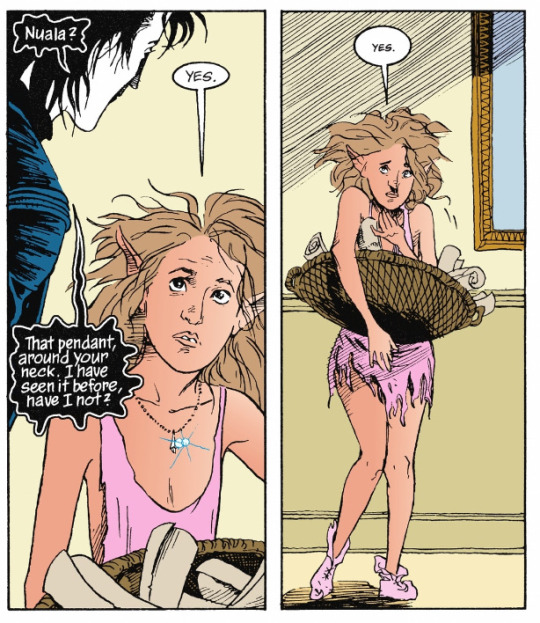
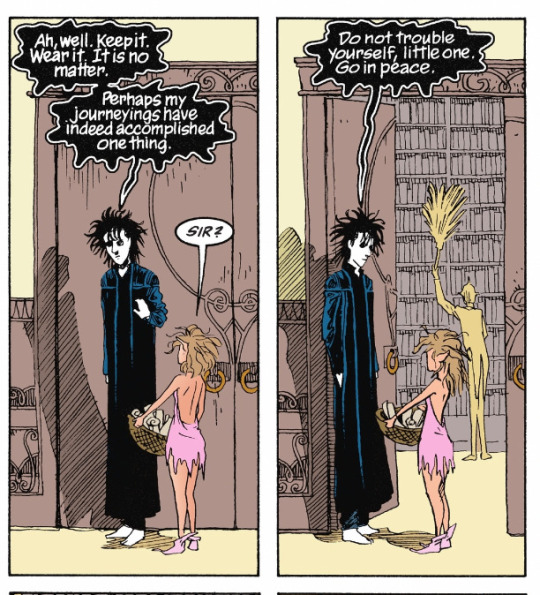
And although I’ve read it all a million times and had all these feelings before, I just need to blurt them out:
Love Is What Changes Him
It’s such a central message of The Sandman, but I feel it often gets lost in a million other things. And they’re all important, but so is this one.
Because yes, Dream went with Delirium and found Destruction (and Despair found him btw), and his Destiny was Death. And that whole Desire thing… ‘nuff said. BUT… (major spoilers ahead)
Those panels above are basically the turning point in a nutshell. No, well, the turning point is actually the moment he kisses (and then kills) Orpheus, but those panels are the essence:
He set out with Delirium in hopes to find Thessaly (the pendant Nuala wears here used to be hers, and she gave it to her when she left the Dreaming and him. And I can’t even begin to tell you how I feel about him letting Nuala keep a gift of his ex, who betrays him later by protecting the woman he hurt, and then making it the item that holds the power with which Nuala can call in her boon. One could spin that very far in all sorts of different directions).
But when he comes back after killing Orpheus, it doesn’t really matter anymore. Thessaly was the usual romanticised dream that could never be real. But he finally did find love. For his son. The unconditional kind. The one that doesn’t need anything in return because it just is. And he was loved back, if for a brief moment. But it was real, not a dream. And that love stays real (that’s why it initiates the turn, 3rd act and all that).
I’m reminded again of the words of Frank McConnell in his intro to The Kindly Ones:
“And with [killing Orpheus], Dream has entered time, choice, guilt and regret—has entered the sphere of the human.”
(Side note at this point: With all of this in mind, read Dream Hunters [again], and look at all THREE main characters—that includes the onmyōji, not just the monk and the fox.)
And it would be so easy to say, “Well, love killed him then, what’s the fucking point?” Not just the love for his son, but also the love of a maiden who called in her boon (Nuala), the love of a mother for her child (Lyta), the love of a crone for no one but herself (Thessaly).
But we all know that “change or die” was never an “either or”, because it’s an “and both”. And it’s ultimately love, in all its shapes and forms, four times over, that changed him (while it was also part of the death knell, but that’s a complicated one. In any case, it also led to change: To be(come) a new, better, kinder Dream).
Yes, call me romantic or hopeless (although I think that’s the wrong word in this context, because I feel it’s the opposite), I don’t care.
Because that story is about catharsis. And that means Dream is a vessel for our feelings. And the feelings won’t be the same if we change any of this, for better, for worse. Because truthfully: That story is about me. And you. And you.
About allowing love, of whatever kind (this is very clearly not just about romantic love), to change us. And that ultimately means letting go (of control). Just like he did.
Bleurgh, I’m crying. Catharsis 🤣
#the sandman#sandman#neil gaiman#dream of the endless#morpheus#daniel!dream#sandman meta#sort of because it’s a bit feely#and shortish and without a million references#but I’ve brought them several times#in my pinned post#sandman analysis#sandman character analysis#the sandman comics#nuala of the faerie#lyta hall#Thessaly#orpheus sandman#love changes#tragedy#catharsis#sandman spoilers#the sandman spoilers#sandman book club#sandman bookclub
95 notes
·
View notes
Note
In another post you mentioned you had marked all your favorite Sunflower moments/interactions. Do you mind sharing your favorites with your devout followers?
Much love, Fauxraven
It is high time I come back to writing in here.
I will start by answering some questions, I've been overlooking for a while and then will share why I was away for as long as I have.
Let's discuss my favourite Sandflower interactions though. Thank you for the question and this is going to be quite lengthy as a post, but please bear with me. + the interactions are not ordered by how favourite of mine they are, but rather chronologically for the sake of order in the post 🪷
!Spoilers for the entirety of the Sandman comics under the divider!

Season of Mists
This one is very easy. It's the first time they meet and immediately two panels are very important to me as far as their relationship goes.
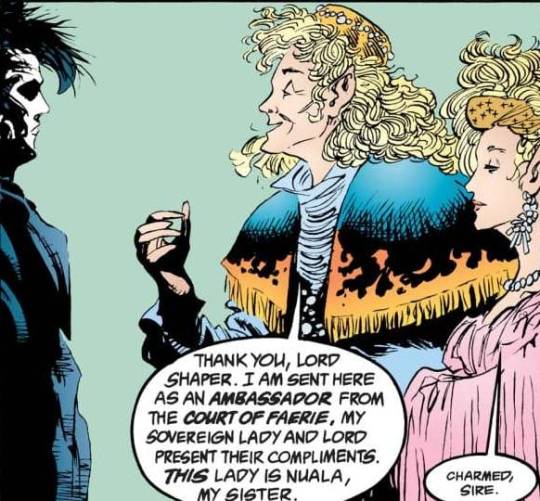
People make the VERY wrong assumption Nuala was always enthralled by Morpheus but she wasn't. She met him under her "Ice Maiden" title - a fairy so desired men died for a sliver of her attention. She went to the Dreaming as ordered by Titania, the reasons for which could be discussed in another post. Nuala being a gift to Morpheus is a very calculated move by Titania, putting both Nuala and Morpheus in extremely uncomfortable for them positions. Initially. The reason I love this panel is because it shows simultenously that Nuala didn't care about Morpheus at all and she was being arrogant towards him.
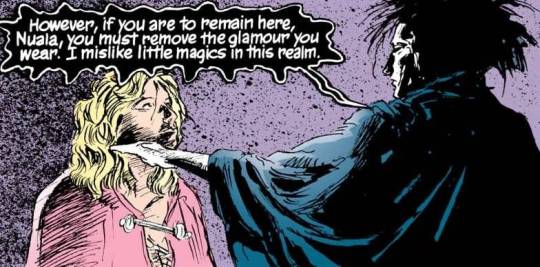
The second interaction in Season of Mists that I want to point out is this panel right here. Although on the surface this entire interaction is quite meaningful this panel right here is very important for two reasons. One and that is the obvious one, he is forcing Nuala on a journey of self-discovery and love, stripping the deceptive glamour thrusted upon her from the moment she first existed (all fairies wear glamour). Second, Morpheus notes to "misliking little magics in his realm", which is factually untrue - everything in his realm is magic in one form or another. What he dislikes is not being in control of the magic being distributed throughout his realm. So here already he had begun very clearly being dishonest with Nuala, which we will see further becomes a pattern - he will say one thing and do the exact opposite.
A Game of You
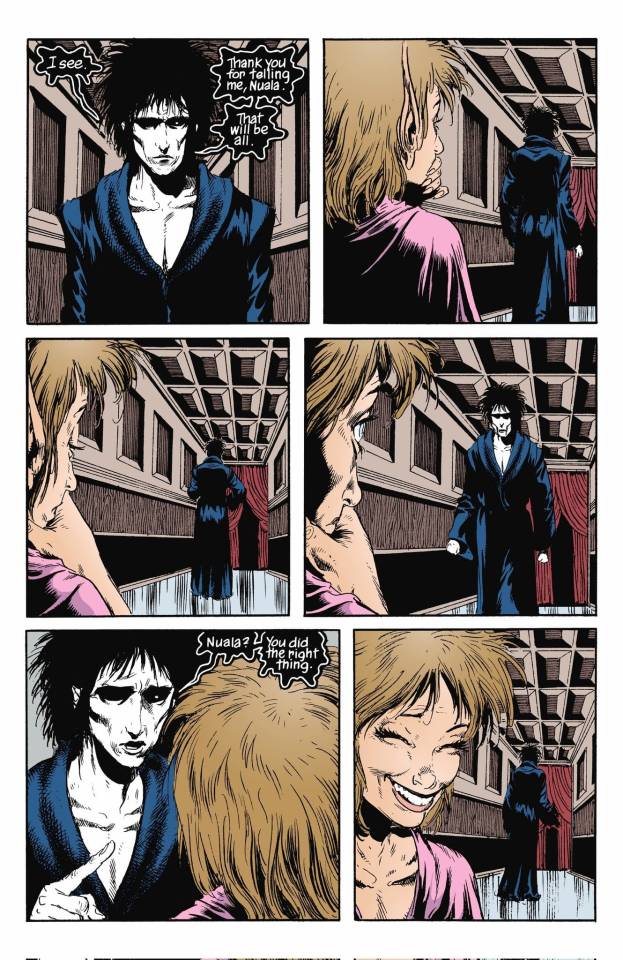
The famous page. But what people rarely talk about this panel is that Morpheus makes the active choice to be nice to her. Something he doesn't do. It is okay to not believe me, but go back, read for yourself, Morpheus doesn't praise people, he doesn't hand out empty compliments or say nice things to people in general. Now, this is the first time he does that with Nuala. He will do it one-two more times I think - he will praise her to other people and briefly before they separate for the last time. Nuala is someone Morpheus harbours positive feelings for. However, from that point forward, we will see Morpheus making the choice to act in a way he usually doesn't and do things he doesn't usually do. This is the face of the Sandflower community (me and my three bitches), but it is not my favourite panel by a long slide.
Brief Lives
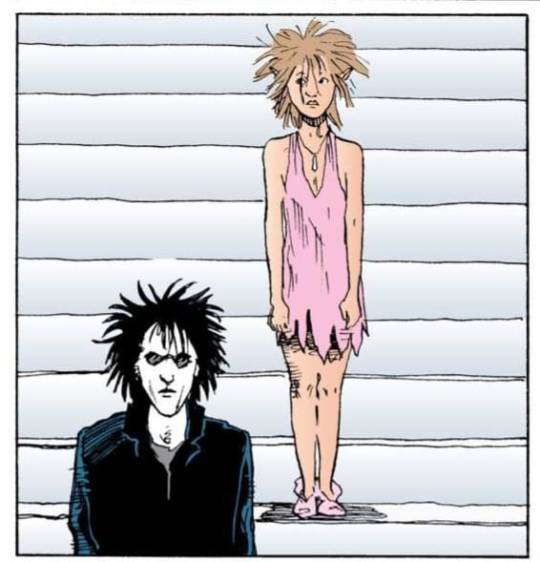
I can choose a lot of interactions from "Brief Lives" however that will take an excrutiating amount of time. The most important thing about Brief Lives is the pendant Nuala receives from Thessaly, Morpheus' nasty attitude, because he is being whiny he got broken up with and what a wonderful pretty girl Lala is. This panel encapsulates that so that's why it's here.
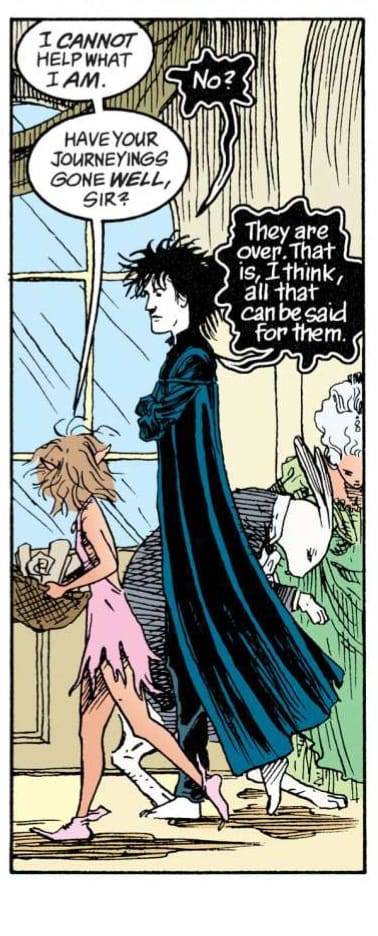
THIS interaction has to be top 3 of my favourite interactions between them. Remember when I said in the beginning people hold big misconceptions about Nuala as a character - that she is a weak, spineless character that fades into the background. This panel is my favourite to disprove those.
"Nuala is meek to Morpheus."
No, Nuala likes Morpheus, there is a difference. Because if she was meek, she would've never stood up for herself or put him in his place, which she does in this very conversation despite their more than obvious power dynamics. While Morpheus shows open distain for her people, Nuala simply and confidently tells Morpheus she cannot change who she is, which is a surprise to the Dream Lord. She is unwilling to allow to be slandered like that whether he is a king or a jester.
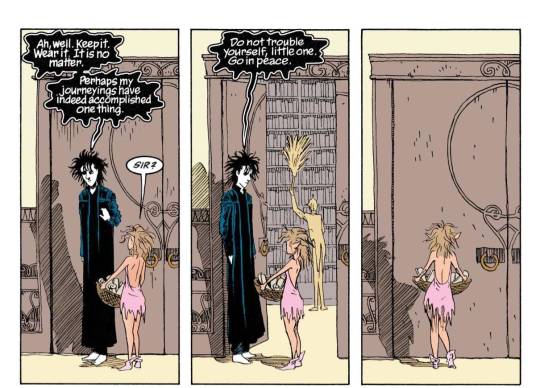
This one is here because 1. He lets her keep the pendant, which at that point is not deliberate on his side but it will become a point of deep connection between them (there is a theory about the pendant, another post I want to write a lot), in a way he didn't have with Thessaly mind you. 2. He calls her "Little one" and I think that is adorable.
World's End
I will not put anything from Worlds End because it's the most important Sandflower volume in my opinion. I will, at some point write a whole post about Issue #52. For now, if you're interested go read Issue #52.
The Kindly Ones
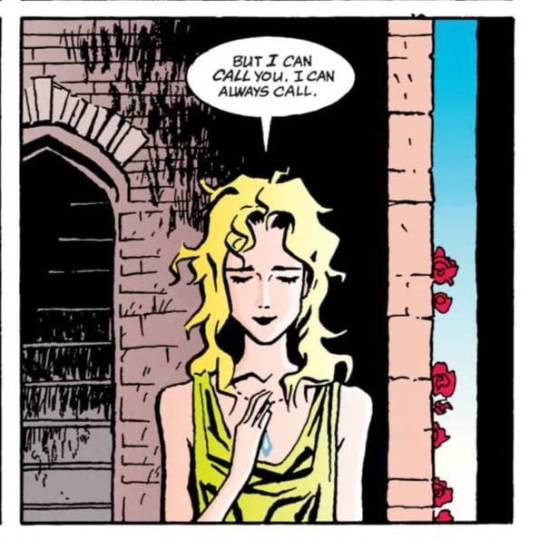
This is my single favourite panel in the entire Sandman. Nuala and Morpheus were the original "You came/ You called" and I can't wait to see it in the series through the eyes of Nuala's actress and Tom Sturridge. ( I want to write a whole separate post about the pendant too, so, for now this is enough).
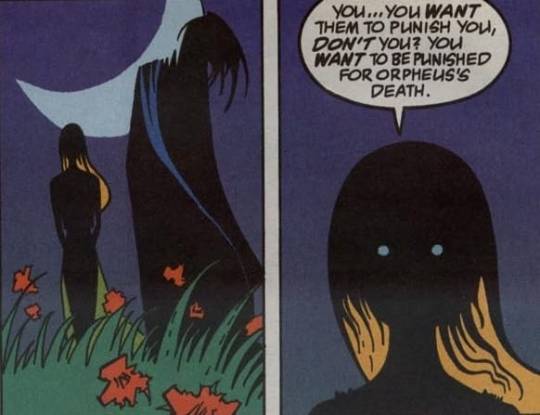
And lastly, I could put their whole conversation here and I could put the numerous comparison's between Morpheus' relationship with Thessaly and with Nuala. But I won't do that because they are irrelevant.
When Nuala became "The Maiden" both in the sense of the Kinly Ones and Persephone, she became a tragic figure bound by her love for a man that is quietly self-distructive. If you go back and read through the comic, there is a distinct uncertainty about Morpheus' coldness from his official partners - Calliope says he suddenly became cold; Thessaly believes he sees people as things he wants until he gets them and then he gets bored; Titania does not talk a lot about the nature of their relationship, however from context we can infer he also stopped responding to her at some point and she is still hung on him (as seen by her conversation with Nuala). Only Nuala recognizes his coldness for what it is - a deep inner hatred of himself and usage of loneliness as a means of punishment of himself. She ecognizes the patterns of his behaviours from his standpoint as opposed to her own, symbolizing the level to which they are connected, whether we as readers realize it or not (because I initially didn't). Nuala wants to save Morpheus, but she is very well aware that she can't.
As for Morpheus he choose Nuala as the last woman (because he did choose to go to her, he had every right to refuse and protect his kingdom, despite the boon) to visit before his death, even though Thessaly had at that point broken him up and he had given up (as by the red flowers in their feet). It is such a heartbreaking panel. Because it is the one that actually shows the depth to which Nuala sees Morpheus past his mask and the level to which Morpheus lies to her for a reason we never find out.
An amalgamation of all they had experienced together is him saying "He didn't notice" and yet, no one who has read the comics from start to finish believes Morpheus. He doesn't believe himself. She was the last person outside of his closest circle he ever saw. Why? Because of his responsibility to a boon? No. He could've left, he knew she would understand, even though she was most adamant he should stay. He stayed because he wanted.
~*~
My personal belief here is that Morpheus in his evident self-hatred did everything in his power to make Nuala turn away from him. He recognizes her as something good and we know Morpheus does not believe he deserves good things. So their last conversation is also a way for him to hurt her to a point where she wouldn't be in pain once he dies. Because she is good and he is not.

Author's note:
It's on posts like these that I realize how much I've uncovered about Sandflower since I first started. I genuinely thought I was in a crackhead space and yet, going back and reading again it's truly baffling how many times Neil wrote actions instead of words - because the good thing about comics is that we can not only read we can see, and the actions Morpheus takes towards someone he doesn't seemingly care about all that much, do not align with his words. I encourage everyone to make their own headcanons or draw their own conclusions. These are my personal and of course they highly reflect my biased viewpoints.
Love,
Li
#the sandman#nuala#nuala of the faerie#morpheus#sandflower#dream of the endless#the sandman netflix#nuala the sandman#Sandman analysis#sandman comics#the sandman comics#sandman meta
64 notes
·
View notes
Text
Something i wanted to point out with the corinthian in the adaptation that i havent seen others talk about: corinthian is known to be pan, but in the show you only ever see him sleep with male victims. He kills women, yes, but you dont ever see him sleep with them before killing them. Idk i just like that they didnt play into that gross and dark trope of having a woman around just for sex and then killing her. I like that it doesnt play into that sexualization of violence against women
114 notes
·
View notes
Text




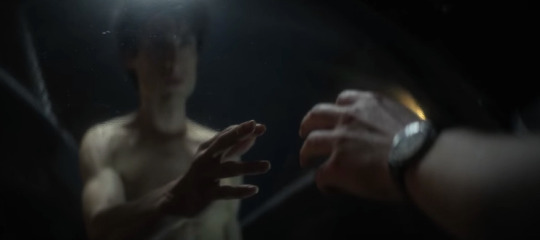


sandman + restraint, florence and the machine + you don’t own me, tamino
51 notes
·
View notes
Text
TENTATIVE ANALYSES: THE SANDMAN
Chapter 9: Tales in the Sand
SUMMARY
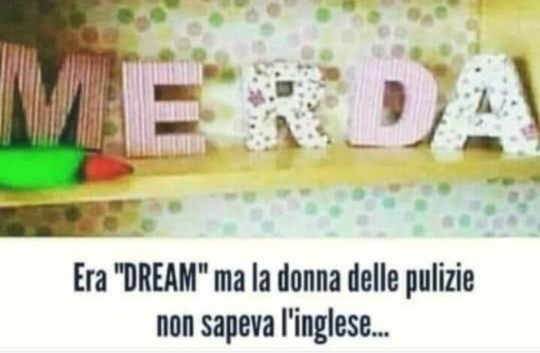
Nonno Neil ti racconta una fiaba.
Seriously though, the narrative frame of the tale of Nada is literally a story, told by an older man to a younger one. It takes the approach of a so-was story: 'so it was that this land was once a lush valley, and how it turned into a desert.
The tale does involve Morpheus: once the queen of the First People, Nada, fell in love with him, and underwent several hardships in order to find him and declare this love.
Only, here we learn that it's forbidden for the Endless to love mortals, and once Nada realized was she had done, she tried to escape from him with a series of trick. They fail, Morpheus catches up to them, the two make love, the sun gets pissed and decides to solve the situation by annihilating Nada's city with a huge fireball.

The woman, seeing this and realizing that nothing good could come out of this relationship, throws herself down a cliff. But not even death can stop an horny Morpheus: he chases her down, and threatens her with hell if she won't become his wife. The woman refused.
And here's how she came to be to where we first met her in Chapter 4: one of the tormented souls in hell, whom Morpheus still refuses to forgive or help.
NARRATIVE TECHNIQUES
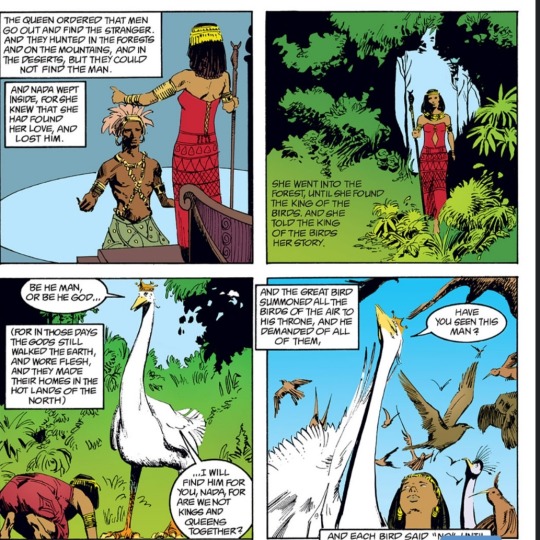
This chapter is told through a narrative frame: a story told to a young man who is undergoing a coming-of-age ceremony. It is a very self-aware story: we are told, from the start, that there is another version of it, the one the women of the tribe tell each other, in which things might have gone differently. A warning to the reader, too: it is not said that we have just read is the objective truth of Morpheus' tragic love story.
CHARACTERS
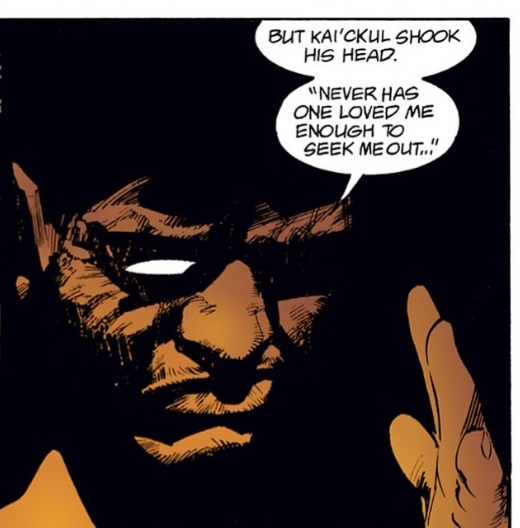
Morpheus: we have never seen our hero so unheroic.
Sure, so far we have seen him dish out terrible vengeances, but on people who deserved it. We have even seen him be merciful, on Rachel and John Dee. We have seen his interaction with the tortured soul of Nada, and it left readers wondering just what terrible thing this former lover had done to deserve such scorn.
And we learn that she had just refused to be his wife.
She hadn't even said that she didn't love him, just that she didn't want to be his wife, and clearly stated her reasons. Morpheus was sweet with her at first, but when she refused him, when she begged him to leave her be, he didn't respect her. He didn't care for her reasons, didn't care that she had just seen her kingdom destroyed and killed herself to avoid further disaster, all he could think of was his wounded pride.
Morpheus is proud, as we have already seen. But we hadn't seen yet these extremes, and this puts his character in a new, more sinister light.

Nada: the beautiful queen of a mythic land, she would have been a perfect fairytale princess if her love interest had been anyone else. She's brave, she went through a lit of trials to find her love; she's wise, she went through even worse hardships to evade said love when she realized it would have spelled only destruction. And she's still enduring, still suffering in hell, for her choice to put the world above herself.
THEMES
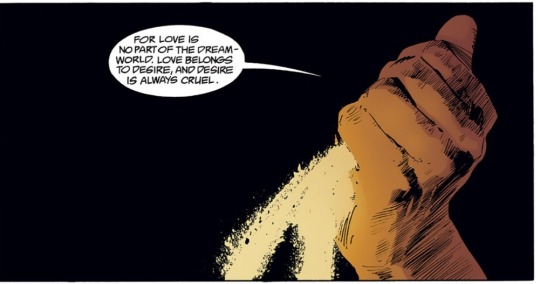
This chapter discusses two things: love, and stories.
This is the first time we see how Morpheus deals with love, and it isn't pretty. He was a complete bastard to Nada, prioritizing his pride above anything else. He says a very touching thing, that no one had loved him enough to look for him, which would have been heartbreaking on its own, but - dude, there's probably a reason for that.
Love for the first time receives an association with Desire. Even in the former chapter there had been a mention of them, with Death bringing them as a negative example. We know they're another one of the Endless. But here we see a very definite: 'Desire is always cruel'.
It doesn't bode well for the love stories in this series.
And then, there is the nature of stories. Stories that can be ambiguous, as underlined by how the different genders in the tribe have each its version. We can't know how the women's tales goes; maybe it says that Nada accepted, maybe it says that Morpheus accepted her decision and didn't condemn her to hell, maybe instead of a fairytale of sorts is an epic that if written would put The Lord of the Rings to shame, detailing a long and complex love story with Glass City lore. We can only wonder.
Still, I have called it a fairytale, but despite having similarities - the talking animals, the multiple trials the protagonist must endure to get what she desires - it is more like a just-so myth, a tale which serves the purpose of explaining a phenomenon (ex. The myth of Persephone to explain the alternance of seasons). It contrast an harsh present with an idealized past, and explains how humanity got to that point. It also includes other just-so stories, like the reason for the weaverbird's plumage being brown.
The tale of Nada contains multiple, perfectly aware references to real-life legends, furthering its metanarrative nature.
SYMBOLISM

The city of glass is a beautiful image, one that evokes excellent craftmanship and a powerful nation, but also a great fragility - and in fact, it will be destroyed at the end of the story.

When Nada turns into a gazelle to escape Morpheus, he stops her by slaining her; a neat representation of his unwillingness to relent from pursuing her even when this is making her suffer.
TRIVIA

The weaverbird myth seems to be a reference to the Rainbow Crow myth, a purported Lenape legend about a raven bringing fire to the world during the first winter, losing its multicolored plumage due to the burns. The Lenape nation denies that the story is theirs, and notice that it actually looks like a variation on the Cherokee legend of the first fire.
Thank you for reading!
#the sandman#sandman meta#sandman analysis#sandman morpheus#sandman nada#tentative analyses#tentative analyses: the sandman
9 notes
·
View notes
Text
Sandman Review and Analysis
I wrote a review of The Sandman. Also it's an analysis. Also spoilers.
The video version will be up later this month.
Enjoy.
1 note
·
View note
Text
Bruh the fact that you can feel Morpheus’ anger through the screen. You can see him tremble with rage as his voice becomes cold hard steel. We already knew Neil was right about what he said about Tom’s gravitas, but that scene was on a whole other level. Even I was terrified, Jesus Christ.
And you contrast that with how gentle he is with Calliope. How upset and terrified he is for her. How he actually begs her to accept his help, because he cannot bear to see her in this situation a second longer. How scared he is she’ll refuse out of pride as he did, because he’s been there and he knows the regret that comes after, and because he sees her imprisonment as so much worse than his. Because he knows Calliope, and it horrifies him that something like this has happened to her.
And at the end, you can really tell how part of him still loves her, and regrets so much about what has happened between them. Because like all his lovers, he’s given her a piece of his heart, and that will never change as the millennia go by. And for chrissake, their relationship lasted long enough for him to marry her, to father a son with her. To raise him and watch him grow up and be there with her and the rest of the Endless on Orpheus’ wedding day. And for Morpheus, even after thousands of years of bitterness and sorrow and regret, to come to her aid and demand she be freed, and to tremble even as she talks of forgiveness and presses her forehead to his cheek.
#original post#fandom#the sandman#the sandman netflix#i am perfectly normal after watching the bonus ep i swear#i have so many Thoughts#aaaaaaaaaaaaaaaaaaaaaaaaaaaaaaaaaaaaaaaaa#the sandman spoilers#sandman spoilers#dream of the endless#calliope sandman#tom sturridge#character analysis#quoth the raven
10K notes
·
View notes
Text
The Corinthian: more than an object but less than a human and a wretched reflection of his creator
My obsession with the Corinthian is so funny because at first it's like ok. Cool. He's this gay serial killer nightmare with creator issues who's turns out to be a charming antagonist while he's pitted against dream and going about his nefarious plans on screen. What's not to love?
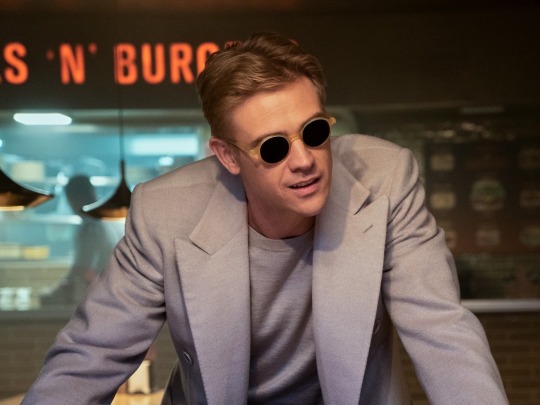
But then there's the next layer of oh...he has preferences and quirks and interests, but he's not a person enough to be a human he's a tool.. that's why he gets unmade in the middle of the street by his lord!! That he had a couple millennia of history with!! Because it's easy.. Dream has the blueprints, therefore remaking the Corinthian and editing out these faulty design aspects is pragmatic. It's efficient. It's less effort and way less emotionally taxing that trying to wrangle in your rogue creation and trying coax them back into doing their job. A human makes a mistake, you correct and reprimand them and offer a better course of action. But if your wrench rusts, you throw it away and buy a new one. It doesn't matter if it's your prized or even your favorite wrench, if it's been rusted to the point of uselessness, you toss it.
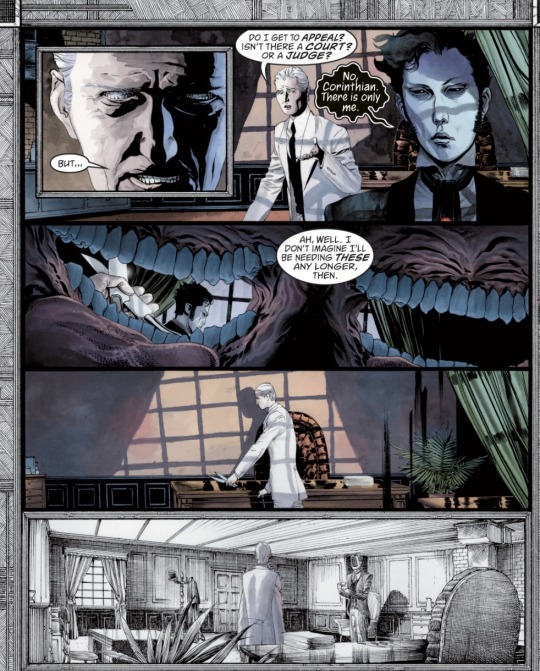

And the Corinthian, the agonized wrench, can probably only think: "Did I really mean so little to you?"
I think it totally fucks with his mind. The fact that Dream refers to the Corinthian as his masterpiece and yet he is still lesser in every form of his being—his agency is lesser in every form.
But you can't really blame Dream, can you?
Dream treats the corinthans agency like he treats his own—unnegotiable. For him, it has always been perform your function or die.

Dream: We are, each of us, born with responsibilities. Even I am not free to choose to be other than what I am.
And the Corinthian, in his own eye teeths, has performed his prescribed duty perfectly without hesitation or fail for thousands of years as well and worn as a well used knife—but he knows he can do more, so he does. Because if his function is to chase and slaughter in the dreaming, what's to say can't do it in the waking too?
Besides, in the waking, he's realer. More combobulated. More valued. If you're a mirror for long enough you start to crave a look of your own.
And oh, even with the thrill of newfound freedom, he loves his lord. He's eager for to give to him—to share with him—everything that's ever been dreamed of. In the Corinthians long, long, life he has only ever had his purpose and his lord and for a while that was enough, but his expectations evolve, he changes.
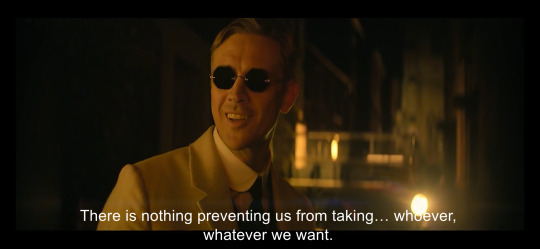
And that's really what dooms him.
Over the course of The Sandman you can see that looking deeper into Dream's ideology "perform your function or die" reveals one of the true themes of the sandman which is "change yourself or die." The Corinthian, whether intentionally or unintentionally serves as a mirror to dreams own character arc and the way dream treats himself.
Like how people put facets of themselves in their original characters, I think that in the corinthian Dream put a version of his own insatiable hunger; to break every rule, to run freely, to enjoy hedonistically. In creating the Corinthian as a mirror Dream unknowingly reflected a distorted face of one of his own buried desires—and i think he couldn’t accept that.
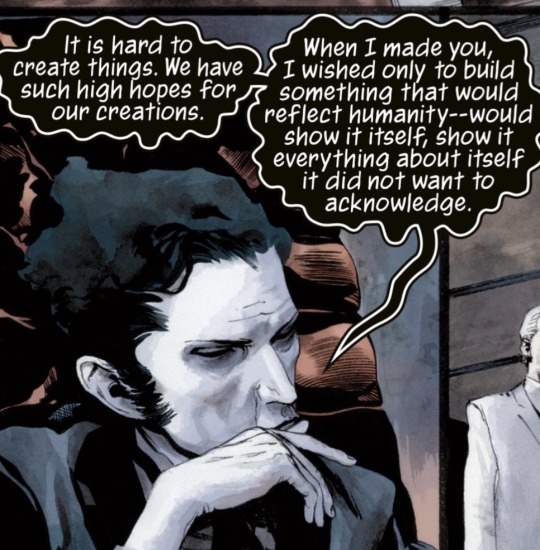
The Corinthian even calls dream out for it at the serial convention (even though he's advocating for murder) he's also jabbing at Dream's unwillingness to show emotional vulnerability and the cage he's built around himself.
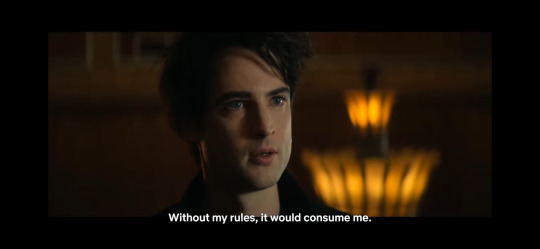
Corinthian: Or you might actually feel something.
The dream the Corinthian knows he always cared exceptionally little for humans save for a select few, so what remains is this. Dream might've cared for the Corinthian, but he would unmake him, his prized creation, not for any moral justice, not for a personal slight, but for his rules and nothing else.
For the corinthian, who has spent years upon years upon years with his lord, fighting in his wars, chasing after his approval, pouring every ounce of love and loyalty to him—it stings.
And then there's this scene.

Dream: You're right. This was my fault, not yours. I had so much hope for you. But I created you poorly then.
This is the Corinthian, knowing he is about to die, spilling his frustration and spite to his creator for maybe the first and last time and trying, desperately, to make dream understand that none of this is fair (it's never been, for either of them. It's been the function and nothing else for an eternity but they could be happy.)
This is Dream purposely misinterpreting the Corinthian in the way that is guaranteed to hurt the him the most. Dream, with a writer's indifference, reduces the Corinthian's complicated desperate desire for freedom, rebellion, and his creator's love to his typo. Like a character’s grievance towards their writer, like a man’s outrage towards their god, Dream decides not to deign the corinthian with even the right to call his treason his own. He will not even let him have that bit of agency. No, Dream made the Corinthian wrong.
And then Boyd Holbrook does a phenomenal piece of acting here—he knows how to play evil and charming so well but the Corinthian’s vulnerability is so starkly on display it feels like a knife.
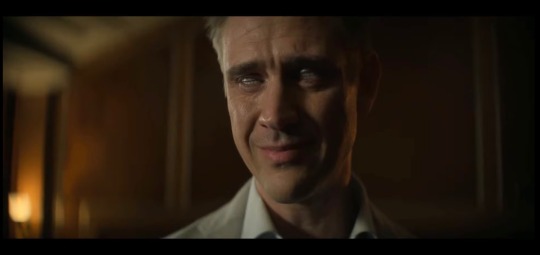
And when you imagine he is about to burst into bloody tears and anguished final words, this is how it ends: they leave each other cruel and jagged, because the corinthian will not end pathetic and he will have the last word.
The Corinthian: I am only sorry I won’t be here to see Rose Walker do the same to you.
The first Corinthian never gets a happy ending.
I don’t think there’s any universe where he doesn’t bite more than he’s allowed to and there is no world where he can really be forgiven. As there is no universe where Morpheus Dream does not stubbornly tie himself to his function and hurt himself and those around him with his pride.
In objectification and the inability to change, they exist as wretched mirrors of each other: The first Corinthian, sick of his function and executed for abandoning it, and Dream, unendurably tired, taking his sister's hand in his when he can no longer bear to perform his duty.
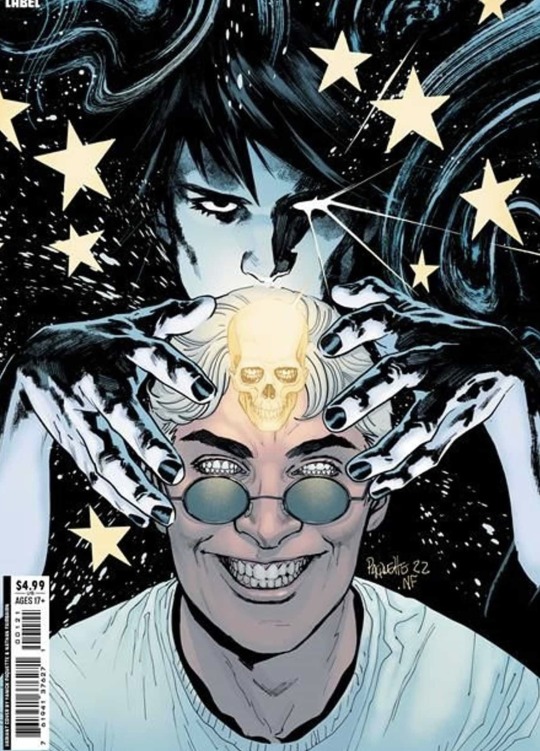
#sandman spoilers#this is literally just me going on a long winded and poorly organized tangent 😭#the sandman#the corinthian#dream of the endless#corintheus#character analysis#musings#long post
460 notes
·
View notes
Text
Idk if i'm ever gonna stop yelling about dream's last parting salvo to lucifer that hell would hold no power if people couldn't dream of heaven; if lucifer couldn't dream of heaven. That line is morpheus making it personal, reminding lucifer he knows what it is the devil dreams about, that what IS hell, if not lucifer's nightmare, and that he, Dream, is also king of nightmares, all in one go. Morpheus came for Lucifer's life with that line. Iconic.
#i've watched the hope in hell episode more times than i'm going to admit publicly#for ANALYSIS...and also for the way tom sturridge's voice rasps when he says certain phrases like 'snake devouring#i am a multifaceted person with many interests#tom sturridge#the sandman netflix#the sandman#dream of the endless#morpheus#lucifer morningstar
2K notes
·
View notes
Text
Just rewatched Calliope episode of The Sandman and it occurs to me that this episode strongly implies that Orpheus is dead and gone??
The Hecate state that he "died in Thrace" (which technically he did in the comics too but he lived on because of Death withholding her gift).
Then when Calliope requests to visit Dream in the Dreaming sometime, in a change from the comics she gives her reasoning as "so we may talk about our son and grieve him properly".
Yet in the comics, it is made clear that Calliope visits Orpheus on the island at least somewhat regularly both before and after her imprisonment. So what she says in the show doesn't make sense unless Orpheus is already dead properly in the show?
But that would be a huuuuuge change to the story so surely thats not the case? I probably missed a lot of discussions about this after the show first came about before I caught the brain worms and had to analyse the comics with a fine tooth comb so I would love to know what others think about this.
@duckland @so-i-grudgingly-joined-this-site @notallsandmen tagging for your thoughts as well as anyone else who wants to answer!
416 notes
·
View notes
Note
Hey there! I hope you’re having a good day. I just saw a post you made about Dream’s type romantically. Thoughts on Calliope and Dream’s relationship specifically? It always stands out to me how though Dream has had a number of lovers throughout the millennia, Calliope is the only one he married. (And of course, Melissanthi Mahut and Tom Sturridge’s blistering chemistry in the show is an additional component for me xD but feel free to respond only based on the comics if you wish!)
Hey, always happy to see your asks in my inbox!
So, first of all; I don’t care what everyone else thinks:
Dream and Calliope are the OTP even though I’m not a shipper. There, I said it, hit me over the head with a hammer, I live well in that tiny little corner of fandom 🤣
Conceptually, they are very, very alike. There is definitely something in there about dreams marrying epic poetry (and eloquence!) that’s just so on the nose.
But I also can’t help thinking: Slight power imbalance maybe, and we also get this more directly via the “all gods get born and die in the Dreaming.” I think often about how this would have played out for them once Calliope’s last worshippers have died—it’s certainly a tough one, even if their relationship hadn’t soured.
But even so: She is the Muse of Epic Poetry, he is the Prince of Stories, so there is A LOT of overlap between what they stand for. And hence, a lot of mutual understanding. They always struck me as *getting* each other (probably why they fell in love in the first place)—until they didn’t. The fact they didn’t live together was good for them I think, because thoughts need to be allowed freedom to form and develop. Plus, there’s also a lot to be said for Calliope keeping her independence that way. Not just in terms of personhood, but again if you think of how she was essentially created in, and will return to, the Dreaming. It’s probably wise for her (in conceptual terms) not to hang out there ALL the time?
She seems a lot more grounded in the mortal world than Dream is though. I always thought that was down to the fact that humans know her, as in actively worship her/ask her for inspiration, which must make her much closer in a way? Because bar a few, no one really *knows* Dream exists, although everyone does, if that makes any sense? Mortals know him on a subconscious level (that’s why he’s forever nebulous and *lonely*), but people know Calliope as a deity and seek connection explicitly. I’m not sure what I’m trying to say here, but to me, that was always a reason why, although a goddess, she seemed far less removed from the mortal plight than Dream was (at least when they were still an item—we all know he changed, even if he didn’t admit it [well, he did in the end to Nuala, which is a whole ‘nother topic]).
And when I think about why they didn’t work out, I can only think: “Orpheus”.
I mean yes, she said that they were already starting to drift apart slightly before she was with child, but there was still a lot of love between them even so. I think the death knell was to have a child on these wonky foundations. Why they did, we’ll never know.
Conceptually, there’s again something very deep and painful about dreams and poetry becoming something real. And then, that mortal child becoming immortal (until his father finally intervenes). But Orpheus was still all mortal and human to his core, even when he became immortal for a while, and that was *always* at the base of their rift. But I digress…
Back to why was Orpheus the death of their marriage? Dream’s advice to Orpheus was sound, yet it was unfeeling and lacked empathy. Calliope’s was maybe (?) not as reasonable, but she understood her child because a mother’s love is (usually) unconditional. We all know Dream’s wasn’t for a long time although it should have been.
I think if they’d all sat together as a family, supported their son in his grief in a balanced way, this whole catastrophe could have been avoided (I mean no, not really—it’s a tragedy, “doomed by the narrative” and all that). But all of Dream’s relationships (be that to his son or his lovers) fail because he is unreality (hence he has a hard time when things quite literally get real), and despite *knowing* mortals on a very deep level, I don’t believe he truly *understood* them at this point. But I think Calliope did—maybe due to who she was, maybe just because she actually *allowed* them in? Because Dream never truly did that. And when he finally did and truly understood what unconditional love actually means, he came apart at the seams and unravelled.
There’s also something really interesting conceptually in thinking of the Prince of Stories who doesn’t believe he has his own, and the Muse of Epic Poetry who inspires. Who is trying to control whom in this scenario? It’s mirrored in how they behave when the whole Orpheus tragedy takes off:
Calliope tries to inspire and, dare I say try to control the narrative a bit, and I don’t mean this in a bad way, quite the opposite: She looks for the most favourable outcome for everyone involved, even if it means bending the rules: She tries to convince Dream to put in a good word with Hades and believes he would listen because Gods respect him and, dare I say it, are even a bit scared of him.
Dream is rigid. Which is so mind-bending for someone who is the personification of hopes, wishes and possibility. But he is an immovable object: If he’s right, he’s right. That’s the rules, that’s it. And he won’t bend them, not even for his son. I’m not saying that it’s not understandable from his point of view, because he might know things we don’t (potentially also that although he *could* bend the rules because he has the power to do so, it might have knock-on effects no one else can understand or see—it’s impossible to say), only that they are fundamentally different in their approach although they are *both* about inspiration. And inspiration is so closely related to bringing on change (ouch!).
Part of me wants to say that Calliope uses it to control the narrative while Dream doesn’t, that Calliope believes that we can change our destiny while Dream doesn’t, but that’s also too simple. Because Dream *can* be controlling, but in totally different ways and areas.
I feel like I’m rambling out a lot of unordered thoughts, but I guess what I’m trying to say is that Dream and Calliope were so close because they are so similar in so many ways bar one:
Their understanding how inspiration can be used to bring on change. I would somehow go as far as saying that Calliope understands what it means to have personhood, also for herself, and that’s why she understands it in others (I think this is made *very* clear when Richard Madoc holds her hostage). Dream doesn’t—least not at the point where it would have mattered with regards to their relationship, because I think the fishbowl has changed him in that regard. This is also why he wants to make things right with her I believe. But of course he would never openly admit it (he basically stops himself before blurting it out), simply because it would also mean he’d need to admit it to himself…
With regard to that meta:
I definitely think they were highly romantically attracted, purely down to who/what they are. I can’t say too much about their sexual attraction, but after Calliope’s speech at his wake, it would be somewhat unlikely to assume they weren’t 🙈🤣
Was it unconditional though? No.
Was it pragmatic (that sounds so bad and unfeeling, but it’s not a bad thing, because a certain level of pragmatism is what grounds love in reality and makes it last)? I think they tried. But ultimately, he can never live that way because he is unreality, and I often wonder if they both knew 😭
@two-hands-toward-the-sun ask answered
#the sandman#sandman#dream of the endless#morpheus#sandman meta#calliope sandman#calliope#sandman analysis#sandman character analysis#ask answered#asks always open
40 notes
·
View notes
Text
I have seen much speculation on the high quality of Dream of the Endless as a romantic partner, and I have seen many refute such speculations, mainly citing Nada as proof that Dream is a terrible, capricious lover doomed to failure.
Personally, I think it would fall somewhere in the middle. Dream is, by most accounts, a passionate and considerate lover.
Consider Calliope’s words from the comics: “He was the most gallant of lovers... He delighted in sharing his knowledge. He had a castle filled with treasures, and took such pleasure in showing them, giving them to me. He was so gentle, and his skin felt like white silk against my skin... when we made love, it was like a flame: I felt utterly engulfed, utterly loved. Treasured.”
Or words from another former lover: “...we began a conversation, which stretched over many weeks. And, at the end, he invited me to remain in the Dreaming, as a guest... He began, rather nervously, to court me. And I began, also rather nervously, to be courted. And we were both, initially, extremely happy. He loved me. I do not doubt that.”
In summary, as a lover, Dream is, in essence, a dream :)
And like a dream, it fades.
His first and foremost priority is, and always has been, his duty. Once he’s settled into a relationship, once the shine has worn off, he goes back to work, and his lover is left for when he feels like stopping by.
Both mentioned relationships end this way. A slow drifting away...
And once the drift begins, well. Nada was an extreme example, but reject him, insult him, even if it’s just a loss of temper, and a lover will find themselves shown the door and banned from returning. His anger, his hurt, is cold and sharp and cutting, like the nightmares he rules, and he holds grudges for millennia.
Dating Dream would be a dream, but the breakup is a nightmare.
Enjoy!
#just some thoughts :)#i hope this gives all you lovely fans ~ideas~#:)#ship away!#and be informed#dream#dream of the endless#morpheus#sandman#netflix's sandman#analysis#nada#calliope#i won't tag the other because spoilers :)#shippy#meta#dream x reader meta#shipping
1K notes
·
View notes
Text
Imagine that Miles G uses some phrases and proverbs that are unique to Earth 42 and absolutely no one else knows them. Because the Sinister Six are villainous bastards that canonically love to do everything about themselves.
Once he randomly said "For the Lizard's sake, can you go faster?"
And for a few seconds, everyone stared at him like he's crazy.
#“There's no Mysterio on you” © Miles G#OR “You act like a Sandman in the fater”#AND NO ONE CAN GET WHERE HE GOT IT FROM#I promise to get more analysis later#I'm just in a sport camp and a little tired(#SO HERE'S SOME HEADCANONS MY BRAIN HAS CAUSE IT'S FUNNY#miles g#miles 42#prowler miles#across the spiderverse#atsv#miles morales#earth 42 miles#spiderverse#miles g morales
99 notes
·
View notes
Text
Currently thinking about The New Inn and how Hob literally made Dream his own little corner of the waking world to come back to. This man literally bought a pub next door to The White Horse so that when His Stranger deigned it fit to see him again (because of course Hob didn't know he was imprisoned), he wouldn't have to look far from where they'd always met. He literally wrote instructions on the barrier of The White Horse directing him to the place he bought SPECIFICALLY for this, specifically for when Dream showed up.
And I hesitate to call it a home in Dreams regard, but I absolutely do believe Hob lives in a modest flat above the Inn. Part of this is because it makes financial sense- why buy a house elsewhere and have the extra cost of that + travel (home -> brief stop at the pub -> work -> pub for the rest of the day, waiting for Dream -> home). But also, living there means that when His Stranger shows up (because Hob knows he will, he wouldn't have bought a whole pub for the man if he thought he wouldn't), Hob will be the first to know. If he lives there, it doesn't matter if Dream comes knocking at 3 am, Hob will be there to open the doors for him. He asks his bartenders, daily, if someone unusual had come in - pale, hair as dark as night, beautiful as the sun is bright - and at this point they answer him before he even asks. Even if His Stranger was waiting until their next centennial meeting in 2089, just on the off chance that he wasn't...Hob would be the first to know of his arrival.
So anyway, while I wouldn't refer to the inn as Dreams home (yet...) I would call it Hob's, and he built it with His Stranger in mind. And I don't even think Hob would realise the gravity of this after Dream escapes from his imprisonment. Dream returned to his realm and found it partially deserted- his subjects had left in his absence (save for a key few), he returned and found his family had continued as usual (or as usual as the endless are) without him, the waking world only felt his absence because of the consequences it brought (people not waking up, etc).
Yet there is Hob Gadling and his inn.
There is a place, built specifically for when Dream returned to him. A small corner in the waking world where someone- no not just someone but Hob- had built him a pub, a resting place, with the intention of waiting for him. Hob had carved out this little place, so close to The White Horse, with the intention of making it easy for Dream to find, to come back. After so many people leaving him, or moving on, or just plain not knowing he was even gone in the first place- to come back and find a pub, dedicated to him and his companionship with Hob Gadling...thats gotta do something to you man.
So anyway, yeah. Thinking about how Dream feels when he meets up with Hob, after a century of imprisonment, to find that despite their last meeting...Hob had waited for him. And not only that, but he had built an Inn for him- had made a safe place in the waking world, anticipating his return. Hob had never lost faith in him, and Dream would never turn his back on that again.
#Anyway can y'all tell I'm having big thoughts on this#And yes Hob wasn't the only person waiting but he was the only human waiting#Lucienne waited in the dreaming and of course we know death missed dream also#But Hob didn't even know his name let alone who he bloody was#But he STILL built a whole Inn for that man#Still waited for him in the only way he could#In the waking world#And he's literally created this small life to share with Dream#Gggg I am FERAL about it friends#This was much longer than I expected to do but y'all ate up my analysis posts so#Eat this up too#Sandman#the sandman spoilers#dream of the endless#hob gadling#dreamling#hob x dream#morpheus#netflix the sandman
1K notes
·
View notes
Text

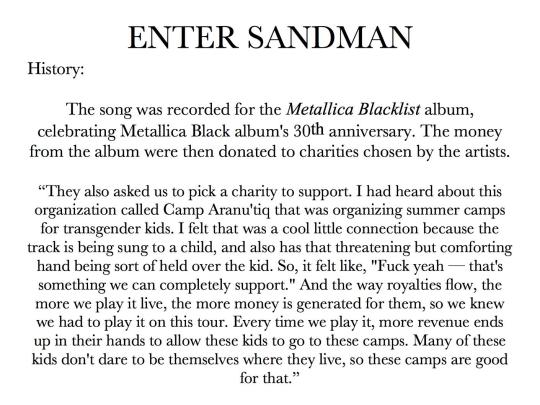

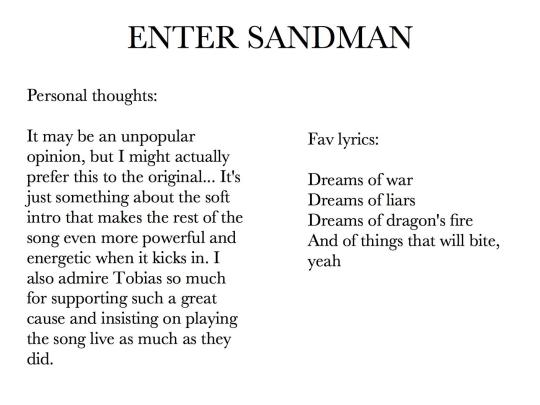
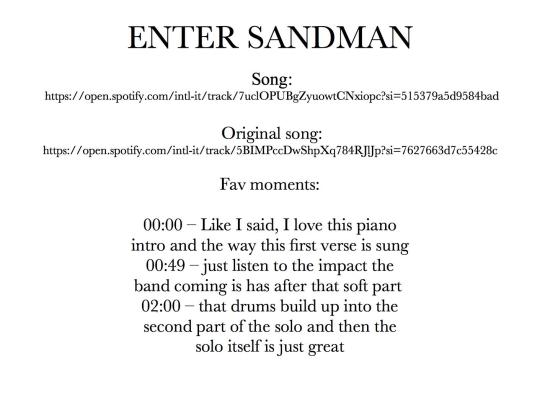
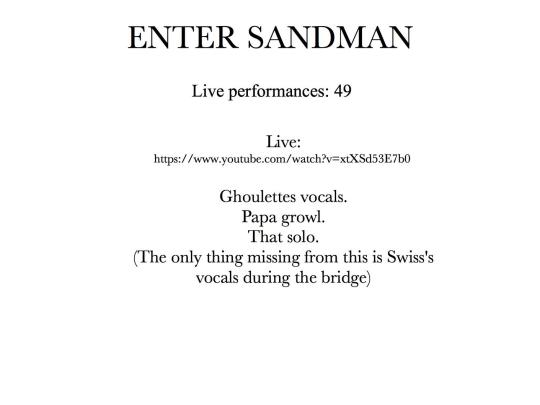
Another day, another cover
Links under the cut
youtube
#ghost songs database#i can already hear met fans screaming at me#but i stand by what i said#enter sandman#ghost cover#ghost band#the band ghost#ghost bc#ghost#tobias forge#cardinal copia#copia#papa emeritus#papa emeritus iv#papa copia#papa emeritus 4#nameless ghouls#ghost analysis#song analysis#Youtube
54 notes
·
View notes